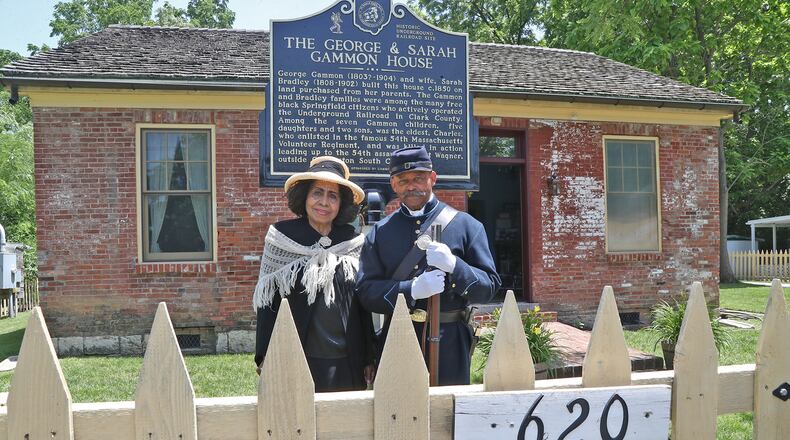Underground Railroad safehouses
Springfield is home to a former site of the Underground Railroad, which was a network of routes and houses that helped guide enslaved people to free states or to Canada.
The Gammon House, located at 620 Piqua Place, is one of three Underground Railroad safehouses still in existence in Ohio that were owned and operated by a family of color.
The house was built in 1850, the same year as the passage of the Fugitive Slave Act. Owners George and Sarah Gammon, who were free people of color, risked imprisonment and large fines for aiding and providing shelter to runaway slaves, according to Gammon House president and groundskeeper Dale Henry.
Springfield’s historic site has hosted Juneteenth celebrations almost annually, far before the day became a federal holiday in 2021. This year’s event was held at the Gammon House on Saturday, and many government offices are slated to be closed Monday in recognition of the day.
‘A day of pride’
Juneteenth carries a lot of meaning for Henry, who said his passion is historic preservation.
“To me, it means a celebration of African American culture and freedom,” Henry said. “It celebrates the fact that we as a people are doing everything we can to move our culture forward.”
For local business owner Camille Hall, Juneteenth is also a time of self-reflection. She said her knowledge of the day heightened after attending Juneteenth celebrations at Gammon House. She now serves as a board member to the historic site.
“It’s a time of remembrance and acknowledgement of the sacrifices and the journey that the enslaved individuals who were escaping, and then in turn freed through emancipation,” Hall said.
It’s also a day of congregation and celebrating: traditionally, families on Juneteenth would gather together to share meals of red-colored foods, such as red velvet cake and strawberry soda, made using red dyes that weren’t accessible to slaves.
Hall said she looks at Juneteenth as a day of pride, too.
“When I think of my ancestors and my family, I see this as an independence day and a time for celebration, but also a time for reflection on those who were unable to make it to that day in 1865,” she said.
Taking time to relax, too, is an important component of recognizing the day as a way to honor ancestors who toiled throughout their days.
“We have the luxury of rest,” she said.
‘Keep them alive’
Springfield NAACP President Denise Williams said she learned about Juneteenth as a young adult, but further connected with the history of the day later on in life.
“Just the thought of our ancestors being freed all those years ago, it’s a cause to celebrate,” she said. “And it teaches me to continue to fight.”
Williams said Juneteenth is also a time to remember those who persevered through oppression, as remembering them is the way to “keep them alive.”
Her thoughts go to her grandmother Eddie, who opened her Dayton home to anyone in need. Williams recalls Eddie had a “shotgun” style home, where someone entering through the front door could see the entire home in full view. Eddie had a few bedrooms in her home, but she always saved one for people who needed it, Williams said.
Her grandmother was also a guardian to young children in her neighborhood who were without food, inviting them into her home for a bite to eat.
“She was the one I experienced helping people with,” Williams said.
Racial equity group Leaders of Change founder Lauren Kelley also recalls her heritage during Juneteenth: her great grandmother, Lucinda Kelley, was the first black realtor in Springfield. Lucinda Kelley started her real estate brokerage in the city in the 1950s.
“She was breaking barriers and making history during a time our country was still very segregated,” said Kelley. “And to see that she was able to make those accomplishments, reach those goals? Our ancestors had no idea that down the road, someone would be accomplishing what she accomplished.”
Kelley said that the concept of the “American dream” was still limited for slaves who were freed, as well as generations that followed them.
“If we’re still living in a time where the Black community is marginalized, and we don’t have access to grocery stores, and our educational system is not up-to-date, and our housing is low-income… that’s still bondage,” she said.
A day of social freedom
Wittenberg University Philosophy Professor Julius Bailey echoed this, saying Juneteenth marks a day of “social freedom,” but many communities are still working toward “spiritual liberation.” Bailey was the keynote speaker at the Juneteenth prayer breakfast at St. John Missionary Baptist Church in Springfield on Friday.
“It’s one thing to be socially free — meaning the laws have freed you — and it’s another thing to feel free and be free,” Bailey said.
Credit: Andrew Grimm
Credit: Andrew Grimm
Bailey referenced the Biblical story of Lazarus, who was storied to have risen from the dead and then ordered by Christ to remove his “grave clothes,” garments that covered corpses as they lay in their tombs.
Modern day “grave clothes” represent many barriers: lack of equity in education, economic issues and community violence. Bailey said many people still carry the “social death” of slavery.
“We live like we’re free, we drive around in our cars, we listen to our music, play on our phones,” he said. “But our children in our communities are dying. We can live with our grave clothes on and never be emancipated.”
Kelley said there’s still more work to be done, and Juneteenth is an opportunity to recognize the need for change.
“I’m praying that the more we acknowledge certain things and honor people for their history and culture, that society will come more and more together,” she said. “Where there is unity, victory always follows. Always.”
About the Author



